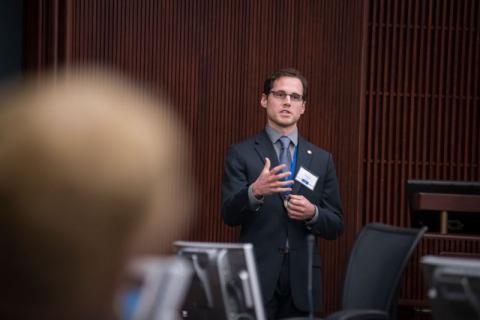Thank you for you the introduction, Dean Deorge, and good evening everyone. My name is Michael Craig. I’m a third-year PhD student here at Carnegie Mellon University in the Engineering and Public Policy Department, which embodies the interdisciplinary spirit of CMU that Dean Deorge talked about. The reason I came to CMU was to work on climate change. I won’t bore you with a litany of statistics, but let me provide you with just 2. First, 15 of the 16 hottest years on record have occurred since 2001. Second, 2016 is almost certainly going to be the warmest year on record, beating out 2015. And 2015, in turn, beat out 2014. As someone with a degree in ecology, climate change really worries me when it comes to natural systems. But it also worries me when it comes to humans and our built environment, both in the U.S. and abroad. So how does my research relate to climate change? Well, I work on climate change mitigation, or how to lessen the future impacts of climate change. Specifically, I research how we can reduce carbon dioxide emissions, which drive climate change, from the electric power system. I’m not in a lab doing basic research & development on a next generation solar technology, which is crucial work. Rather, I use computer models to simulate how the power system as a whole operates. With those models, I can then test the effect of different technologies or policies on CO2 emissions from the power system. For instance, I can input into my model a carbon tax, a popular policy instrument for reducing CO2 emissions, and ask how that affects future systemcosts and emissions. Or I can input a cap-and-trade system, and ask how it affects costs and emissions, and then compare that to a carbon tax. I strive to make my research applicable to current policymakers. To me, the gold standard is if I could send a published paper to policymakers at the state or federal level and have that paper actually help them make decisions. So, how has ARCS enabled me to do this research? I’d break it up into three ways. First, there’s direct support of academic efforts. I had the privilege of traveling to three conferences this summer, which ARCS support helped enable. I’ve also improved my workplace to allow me to work in more comfort, which is getting more important the older I get, using ARCS money. Second, ARCS has provided me with several wonderful professional opportunities. I have the good fortune of being a Lockheed Martin named scholar, and last year Lockheed brought me and other Lockheed scholars to their headquarters. That was a great professional experience to meet people and hear what they’re working on. I’ve also, through Ms. Barbara Granito, a member of the Pittsburgh ARCS Chapter, become involved in the National Academy of Science’s Science & Engineering Ambassadors program. That program has provided me with invaluable lessons on how to communicate with stakeholders,the public, and decisionmakers. Those lessons have helped me already and I’m sure will continue to. Participating in that program has been an immense opportunity that I’m very grateful for. Neither of these opportunities would have happened without ARCS. Finally, and perhaps most importantly, ARCS has provided me with financial security and improved my general wellbeing. I feel like this sometimes go overlooked, but for me, if I’m anxious or upset about something, my work suffers. The significant peace of mind that ARCS funding provides me improves the quality of my work every day. So with that, I would like to thank all of you for the gracious support you provide to me and my colleagues. I also owe an immense thanks to Lockheed Martin, which provided me with my funding and made me their named scholar. I’d also like to particularly thank Dr. Ray Johnson & Mary Snitch at Lockheed, who were instrumental in securing ARCS funding from Lockheed Martin. And finally, I’d like to thank all the wonderful ARCS local chapter leaders, like Pam Meadowcroft, Kathy Testoni, Leslie Dunn, Dotty Nielsen, and the other people I’m sure I’m forgetting who have made everything ARCS-related run smoothly. Thank you for your attention, and thank you so much again for your generosity.

